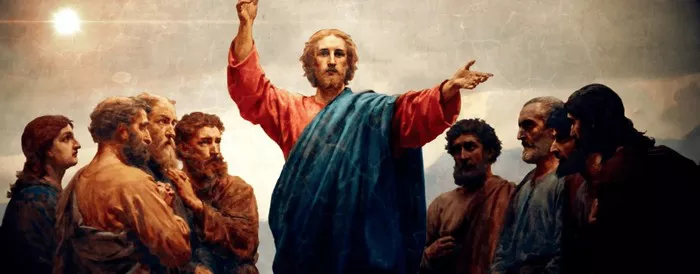The story of Esau and Jacob, two brothers from the Book of Genesis, is one of the most intriguing tales in religious literature. At its heart lies a profound act of forgiveness: Esau forgiving Jacob despite years of deception and betrayal. This act has puzzled theologians, scholars, and readers for centuries, prompting numerous interpretations and analyses. In this article, we delve into the depths of this ancient narrative to uncover the precise reasons behind Esau’s forgiveness of Jacob.
Understanding the Context
To comprehend the significance of Esau’s forgiveness, it’s crucial to grasp the context of their relationship and the events leading up to it. Esau and Jacob were twin brothers born to Isaac and Rebekah, but their personalities and destinies couldn’t have been more different. Esau, the elder, was a skilled hunter, favored by his father Isaac, while Jacob, the younger, was cunning and resourceful, favored by his mother Rebekah.
The pivotal moment in their story occurs when Jacob deceives his father Isaac to receive the blessing meant for Esau, thereby stealing Esau’s birthright. Furious and devastated, Esau vows to kill Jacob, forcing him to flee from his homeland to escape his brother’s wrath.
Years of Separation
For years, Esau and Jacob remain estranged, each building their own lives and families. Jacob prospers, but the shadow of his past misdeeds looms over him. Meanwhile, Esau’s anger seems to simmer beneath the surface, waiting for an opportunity to be unleashed. The tension between the brothers is palpable, and reconciliation seems like an impossible dream.
The Reunion
However, fate has other plans. After many years, Jacob receives news that Esau is approaching with a formidable force. Fearful for his life and the lives of his loved ones, Jacob prepares for the worst, devising strategies to appease his brother’s anger. Yet, what transpires next is unexpected: Esau, upon meeting Jacob, embraces him warmly and forgives him wholeheartedly.
The Enigma of Forgiveness
Esau’s forgiveness is a profound mystery, raising questions about the nature of forgiveness itself and the complexities of human relationships. To unravel this enigma, we must explore several key factors that likely contributed to Esau’s decision to forgive Jacob.
1. Divine Intervention
Many scholars argue that divine intervention played a significant role in Esau’s forgiveness. Throughout the narrative, God‘s hand is evident, guiding events and shaping destinies. It’s possible that God softened Esau’s heart, instilling in him the capacity for forgiveness and reconciliation. Esau’s act of forgiveness may thus be seen as an expression of divine grace, transcending human frailties and animosities.
2. Emotional Healing
Years of separation and solitude may have granted both brothers the opportunity for emotional healing and introspection. Esau, in particular, might have undergone a profound transformation during this time, gradually letting go of his anger and resentment. His encounter with Jacob could have served as a cathartic release, allowing him to forgive and move forward with his life.
3. Recognition of Fault
Esau’s forgiveness may also stem from his recognition of his own faults and shortcomings. While Jacob’s deception was egregious, Esau himself was not without fault. He had willingly traded his birthright for a bowl of stew, demonstrating a lack of foresight and discernment. Perhaps Esau came to realize that holding onto grudges and seeking revenge only perpetuates the cycle of pain and suffering. By forgiving Jacob, he breaks free from this destructive cycle, embracing a path of reconciliation and redemption.
4. Brotherhood and Family Bonds
Despite their differences and past grievances, Esau and Jacob shared a bond forged by blood and kinship. Family ties run deep, transcending petty disputes and betrayals. Esau’s love for his brother, though tested, ultimately triumphs over his anger and resentment. His forgiveness is a testament to the enduring power of familial bonds and the capacity for reconciliation even in the face of betrayal.
5. Wisdom and Maturity
As the elder brother, Esau may have attained a level of wisdom and maturity that enabled him to see beyond the surface of Jacob’s transgressions. He recognizes that harboring hatred and seeking vengeance serve no purpose but to poison the soul. Esau’s act of forgiveness reflects his wisdom in understanding the futility of holding onto grudges and the transformative power of compassion and reconciliation.
Conclusion
In the end, the precise reasons behind Esau’s forgiveness of Jacob may remain shrouded in mystery, defying simple explanations or interpretations. It is a testament to the complexity of human emotions and relationships, transcending the boundaries of time and culture. Esau’s forgiveness reminds us of the power of compassion, empathy, and reconciliation to heal even the deepest wounds of the human heart. In a world plagued by conflict and division, the story of Esau and Jacob offers a timeless lesson in the transformative power of forgiveness and the enduring strength of family bonds.
FAQs:
What happened to Esau after Jacob left?
After Jacob left, Esau remained in the land of Canaan, establishing his own lineage and becoming the ancestor of the Edomites.
Why did Esau hold a grudge against his brother Jacob?
Esau held a grudge against his brother Jacob because Jacob deceived their father, Isaac, to receive the blessing intended for Esau.
Did Esau accept Jacob’s gift?
Yes, Esau did accept Jacob’s gift when they reconciled, demonstrating a willingness to let go of his resentment.
Why didn’t God punish Jacob?
God did not punish Jacob for his actions because Jacob later reconciled with Esau and sought forgiveness. Additionally, God had a plan for Jacob’s descendants, and his actions were ultimately part of God’s larger divine plan.


